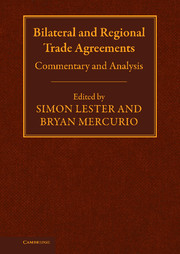Book contents
- Frontmatter
- Contents
- List of contributors
- Acknowledgements
- Foreword
- Table of cases
- Table of Treaties and International Agreements
- Table of abbreviations
- Part I Introduction
- Part II Economics and politics of PTAs
- Part III Relationship with WTO and international law
- Part IV Legal aspects of PTAs: A comparative analysis
- 7 Agriculture
- 8 Services
- 9 Investment
- 10 Government procurement
- 11 Intellectual property
- 12 Social issues: Labour, environment and human rights
- 13 Dispute settlement
- Index
- References
7 - Agriculture
Published online by Cambridge University Press: 16 December 2009
- Frontmatter
- Contents
- List of contributors
- Acknowledgements
- Foreword
- Table of cases
- Table of Treaties and International Agreements
- Table of abbreviations
- Part I Introduction
- Part II Economics and politics of PTAs
- Part III Relationship with WTO and international law
- Part IV Legal aspects of PTAs: A comparative analysis
- 7 Agriculture
- 8 Services
- 9 Investment
- 10 Government procurement
- 11 Intellectual property
- 12 Social issues: Labour, environment and human rights
- 13 Dispute settlement
- Index
- References
Summary
Introduction
Agricultural trade is regarded as a sub-category of trade in goods for the purposes of bilateral, regional and multilateral trade agreements. But in virtually all such agreements, it is subject to special treatment. This treatment in bilateral and regional trade agreements can range from exclusion from the schedule of tariff reductions to import restrictions by quota over a transition period, and often includes specific safeguards and new institutions such as committees to which problems can be referred. In multilateral agreements specific treatment for agricultural products has also been the rule: exceptions for primary products were included in the General Agreements on Tariffs and Trade (GATT 1947) and an Agreement on Agriculture was negotiated in the Uruguay Round that perpetuates the special treatment of the sector.
The reason for such exceptional treatment lies in the sensitive nature of agricultural imports. Most governments share a concern for the security of their country's food supply and the level and stability of the income of their rural sector. This concern has translated itself in importing countries into caution about relying on imports for basic foodstuffs and a conviction that protection from overseas competition is necessary for the health of the rural economy. Those countries with export potential in the agriculture sector have long decried such sentiments, arguing that they can provide a regular supply of foodstuffs at lower prices and that supporting inefficient domestic production is not a sound basis for development.
- Type
- Chapter
- Information
- Bilateral and Regional Trade AgreementsCommentary and Analysis, pp. 143 - 183Publisher: Cambridge University PressPrint publication year: 2009
References
- 1
- Cited by



